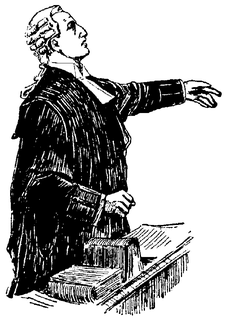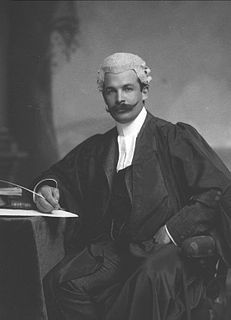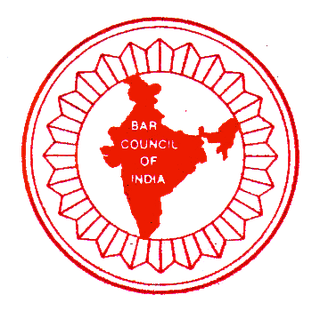Related Research Articles

A barrister is a type of lawyer in common law jurisdictions. Barristers mostly specialise in courtroom advocacy and litigation. Their tasks include taking cases in superior courts and tribunals, drafting legal pleadings, researching the philosophy, hypothesis and history of law, and giving expert legal opinions.

A lawyer or attorney is a person who practices law, as an advocate, attorney at law, barrister, barrister-at-law, bar-at-law, canonist, canon lawyer, civil law notary, counsel, counselor, solicitor, legal executive, or public servant preparing, interpreting and applying the law, but not as a paralegal or charter executive secretary. Working as a lawyer involves the practical application of abstract legal theories and knowledge to solve specific individualized problems, or to advance the interests of those who hire lawyers to perform legal services. The role of the lawyer varies greatly across different legal jurisdictions.
A solicitor is a legal practitioner who traditionally deals with most of the legal matters in some jurisdictions. A person must have legally-defined qualifications, which vary from one jurisdiction to another, to be described as a solicitor and enabled to practise there as such. For example, in England and Wales a solicitor is admitted to practise under the provisions of the Solicitors Act 1974. With some exceptions, practising solicitors must possess a practising certificate. There are many more solicitors than barristers in England; they undertake the general aspects of giving legal advice and conducting legal proceedings.

The Law Society of England and Wales is the professional association that represents and governs solicitors for the jurisdiction of England and Wales. It provides services and support to practising and training solicitors, as well as serving as a sounding board for law reform. Members of the Society are often consulted when important issues are being debated in Parliament or by the executive. The Society was formed in 1825.
Legal ethics are principles of conduct that members of the legal profession are expected to observe in their practice. They are an outgrowth of the development of the legal profession itself.

The Law Society of Scotland is the professional governing body for Scottish solicitors. It promotes excellence among solicitors through the support and regulation of its members. It also promotes the interests of the public in relation to the profession. The Society helps to shape the law for the benefit of both the public and the profession.
The New Zealand Law Society is the parent body for barristers and solicitors in New Zealand. It was established in 1869, and regulates all lawyers practising in New Zealand. Membership of the Society is voluntary, although any person wishing to practice law in New Zealand must obtain a practising certificate from the Society. The Society has 13 branch offices throughout the country. Each branch has a president and a council, which represent their members’ interests on a regional and national level.

Solicitor advocate is a hybrid status which is named to represent clients in higher courts.

The Bar Council of India is a statutory body established under the section 4 of Advocates Act 1961 that regulates the legal practice and legal education in India. Its members are elected from amongst the lawyers in India and as such represents the Indian bar. It prescribes standards of professional conduct, etiquettes and exercises disciplinary jurisdiction over the bar. It also sets standards for legal education and grants recognition to universities whose degree in law will serve as a qualification for students to enroll themselves as advocates upon graduation.
The Solicitors Regulation Authority (SRA) is the regulatory body for solicitors in England and Wales.
In England and Wales, the Legal Complaints Service was a body that formally investigated complaints about solicitors, which was superseded by the Legal Ombudsman in 2010.

The Law Society of Ireland is the educational, representative and regulatory body of the solicitors' profession in Ireland. As of 2011, the Law Society had over twelve thousand members, all solicitors, a staff of 207 and an annual turnover of €30m.

The Legal Services Act 2007 is an Act of the Parliament of the United Kingdom that seeks to liberalise and regulate the market for legal services in England and Wales, to encourage more competition and to provide a new route for consumer complaints. It also makes provisions about the Legal Profession and Legal Aid (Scotland) Act 2007.

The Legal Services Board is an independent body responsible for overseeing the regulation of lawyers in England and Wales. It is a non-departmental public body sponsored by the Ministry of Justice, created through the Legal Services Act of 2007.

The Courts and Legal Services Act 1990 was an Act of the Parliament of the United Kingdom that reformed the legal profession and courts of England and Wales. The Act was the culmination of a series of reports and reforms that started with the Benson Commission in the 1970s, and significantly changed the way that the legal profession and court system worked.
Legal professions in England and Wales are divided between two distinct branches under the legal system, those of solicitors and barristers. Other legal professions in England and Wales include acting as a judge, as the Attorney-General, as a Solicitor-General, or as the Director of Public Prosecutions.
The legal services sector of the United Kingdom is a significant part of the national economy; it had a total output of £22.6 billion in 2013, up from 10.6 billion in 2001, and is equivalent to 1.6% of the country's gross domestic product for that year. The sector has a trade surplus is £3.1 billion in 2013 and directly employees 316,000 people, two-thirds of whom are located outside London. The UK is the world's most international market for legal services. It allows virtually unrestricted access for foreign firms, resulting in over 200 foreign law firms with offices in London and other cities in the UK. Around half of these are US firms, with the remainder mainly from Europe, Australia and Canada. The UK legal market has a strong global position due to the popularity of English law. Some 27% of the world's 320 legal jurisdictions use English Common law.

The Scottish Solicitors' Discipline Tribunal (SSDT) is a specialist tribunal in Scotland with jurisdiction over serious disciplinary issues within the solicitor profession in Scotland.
The Scottish Legal Complaints Commission (SLCC) is a non-departmental public body responsible dealing with unresolved complaints against legal practitioners operating in Scotland. It was established under the Legal Profession and Legal Aid (Scotland) Act 2007 and came into operation on 1 October 2008, replacing the Scottish Legal Services Ombudsman.

The Scottish Sentencing Council is an advisory non-departmental public body in Scotland that produces sentencing guidelines for use in the High Court of Justiciary, sheriff courts and justice of the peace courts. Judges, sheriffs, and justices of the peace must use the guidelines to inform the sentence they pronounce against a convict, and they must give reasons for not following the guidelines.